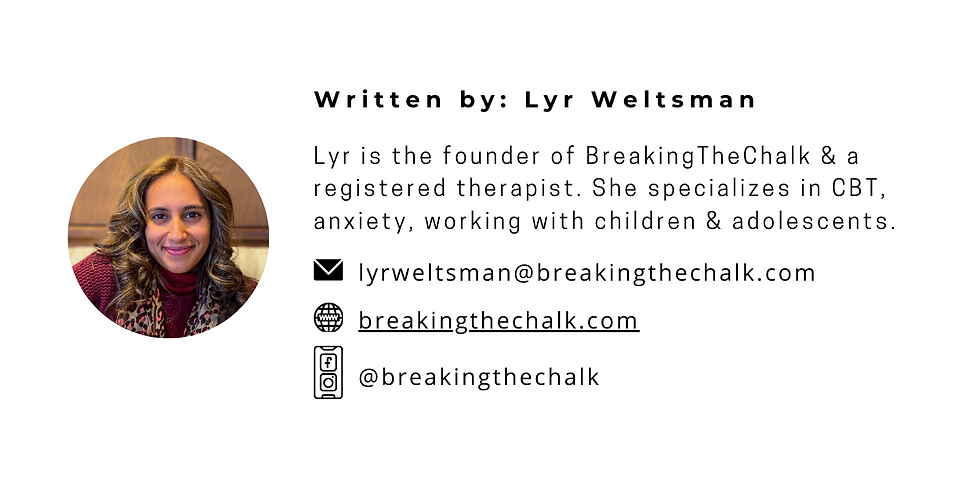How to Regulate as a Parent
- Lyr Weltsman

- May 15, 2024
- 3 min read
Updated: May 16, 2024
Parenting is a rewarding journey filled with love and joy. But let’s be honest - it also comes with its fair share of challenges and stressors that can sometimes leave us feeling overwhelmed, exhausted, and frazzled. In the midst of tantrums, sibling squabbles, and endless to-do lists, it's essential for you to prioritise your own emotional well-being and learn how to regulate during those many difficult moments.
Here are some supportive tools:
Understand Your Triggers:
The first step in regulating your emotions as a parent is to understand your triggers. What makes you impatient, lose it, reactive? Identifying your triggers and patterns can help you to anticipate and better manage those moments with regulation, tools, and understanding.
2. Take a Pause (aka the STOP technique):
When you feel yourself getting overwhelmed, that fire rising up, or dysregulated - STOP and pause. The pause gives you the chance to have a moment to manage the situation more effectively, otherwise it’s fire with fire!
Step away from the situation to give yourself a moment, countdown from 10, take a deep breath or a few, turn around and give yourself some reassurance with a breath. This will also role model to your child how to manage their overwhelm; and talking about the STOP technique provides understanding and compassion.
3. Self-Compassion and Understanding:
Being mindful and non-judgemental of your emotions and understanding your child’s need and emotions in the moment, gives you, your child, and the situation more calm and understanding. Taking a moment to really listen to your child lets you see the need behind their behaviour, to see your need behind your emotions and enables you to respond with empathy and compassion.
Enjoy a free “regulating as a parent’ guide as a quick reminder during difficult days and moments!
4. Set realistic expectations:
Parenting is hard! And no one has it all figured out. Setting realistic expectations for yourself and your children gives you the ability to adjust, to accept the good and the bad and know it’s okay, and forgive with kindness - whether it’s yourself or your child. A child or teen will have age appropriate emotions, behaviours and challenges - remembering this can keep you calmer. Give yourself the reassurance that you’re doing the best you can!
Learning and reflecting on difficult moments is always helpful to take proactive steps to help you better next time.
5. Set boundaries:
Did you know that kids thrive when they have boundaries? And so do you! Set clear and consistent boundaries with your child/teen to prevent escalation, to stay consistent with coping tools and rules, and to ensure that both of your boundaries are respected. Communicate calmly, at eye level, and assertively whether you need a break, a consequence, or sticking to tools and rules that need to be implemented. It always helps with you staying calm, responding and not reacting, and respecting your emotions.
Setting boundaries helps create a sense of safety and predictability for both you and your child.
Regulating your emotions as a parent is a continuous journey, and it’s normal to have ups and downs. By implementing these tools to help you overall and during difficult moments, you can navigate the challenges of parenting with understanding and self-awareness. Remember to validate yours and your child’s feelings and have moments of self-care that you deserve and need.
If you are needing a helping hand to support and guide you through your parenting journey - book an initial parent consult to start sessions










Comments